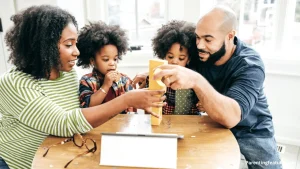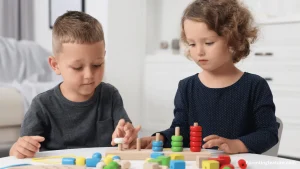The journey of motherhood is a complex tapestry woven with threads of joy, challenges, learning, and unconditional love.
Amid the chaos of daily routines, countless mothers strive to master the art of parenting, aiming to provide the best environment for their children’s growth and happiness. This quest, while rewarding, is not devoid of its hurdles.
Each day brings a new challenge, a new lesson, and a new opportunity to grow. Mothers everywhere seek guidance and support in this noble endeavor, wishing to be the best versions of themselves for their children.
In this context, the following five tips emerge as a framework for improvement in a mother’s parenting journey, promising positive outcomes for both parent and child.
Tip 1: Foster a Strong and Loving Connection
The parent-child bond is the cornerstone of a child’s development. This foundational relationship affects every aspect of a child’s growth, from emotional security and resilience to the ability to form healthy relationships in the future.
When nurtured, it provides a safe space for children to explore their identities and the world around them.
Ways to Build Connection
Building a strong connection with your child can take many forms, including:
- Quality Time: Even short bursts of undivided attention can strengthen the bond.
- Active Listening and Validation: Listening to and validating your child’s feelings fosters emotional intelligence.
- Affection and Appropriate Physical Touch: Hugs and cuddles convey love and security.
- Open Communication and Shared Activities: Engaging in activities builds mutual respect and understanding.
- Age-appropriate Routines and Rituals: Establishing routines provides stability and belonging.
The Power of Presence
In today’s digital age, being physically present isn’t enough. The challenge lies in disconnecting from technology to be fully present and engaged during interactions with your child. This presence sends a powerful message of love and priority.
Also read: Encourage Your Kid to Chew: Practical Tips for Parents

Tip 2: Practice Self-Reflection and Self-Compassion
How a mother responds to her child often mirrors her childhood experiences. Unresolved emotions and reactions can influence parenting styles, making self-reflection a crucial step toward understanding and improvement.
Techniques for Self-Reflection
- Journaling: Writing down thoughts and feelings can clarify patterns.
- Mindfulness Exercises: Being present can help manage stress and reactions.
- Seeking Therapy: Professional guidance can offer insights into past experiences affecting parenting.
The Importance of Self-Compassion
Parenting is a journey of continuous learning. Recognizing that mistakes are inevitable and forgiving oneself is essential for emotional health. Self-compassion paves the way for learning from experiences instead of dwelling on regrets.
Self-Care as Essential
A mother’s well-being directly affects her ability to parent effectively. Self-care enhances emotional regulation and energy levels, making it a non-negotiable aspect of good parenting.
Also read: Empower Kids: Motivate Your Child with Proven Tips
Tip 3: Master Emotional Regulation for Yourself and Your Child
Children learn how to manage their emotions by observing their parents. Displaying healthy emotional regulation teaches them valuable coping mechanisms.
Identifying Emotions
Both recognizing and naming emotions in oneself and one’s child are crucial steps in managing feelings effectively.
Developing Coping Strategies
For parents: Techniques like deep breathing and mindfulness can help manage stress.
For children: Providing tools like drawing emotions or using a “calm down corner” supports their emotional development.
The Value of Co-Regulation
Until children develop the ability to regulate their emotions independently, parents need to guide and support them through their emotional experiences.
Tip 4: Embrace Positive Discipline
Transitioning from punishment to guidance allows discipline to become a learning experience focused on growth rather than a source of fear.
Age-appropriate rules and routines offer children a sense of security and predictability.
Techniques such as natural consequences, redirection, and positive reinforcement encourage desired behaviors and foster internal self-control.
The Long-Term Goal
Positive discipline aims to equip children with the skills to make good decisions and develop self-discipline, laying the foundation for a healthy adult life.

Tip 5: Build a Support Network (and Use It!)
Motherhood can sometimes feel isolating, but building a support network can significantly impact a mother’s mental well-being and perspective.
Support can come from various sources, including partners, family, friends, parenting groups, online communities, and professional help when needed.
Overcoming the stigma of needing help and embracing support for both practical and emotional needs are vital steps in maintaining mental health and parenting effectively.
Conclusion
The path of motherhood is one of continuous learning and growth. Mothers can navigate the complexities of parenting by fostering a strong connection with their child, practicing self-reflection and self-compassion, mastering emotional regulation, embracing positive discipline, and building a support network.
Remember, no parent is perfect, and striving for progress rather than perfection is the key. Start by implementing one tip and celebrate each small success along the way.
For those seeking further guidance, numerous resources are available, from books and websites to professional organizations dedicated to supporting parents.
Let this journey of improvement and discovery begin today, for in every mother’s heart lies the profound capability to shape the future, one loving interaction at a time.
FAQs
1. What is the primary purpose of fostering a solid and loving connection with my child?
The primary objective is to provide a foundation for your child’s healthy development, including emotional security, resilience, and the ability to form healthy future relationships. It also ensures a safe and nurturing environment for them to explore their identities and the world.
2. How can I practice self-reflection as a mother?
You can practice self-reflection by journaling your thoughts and feelings to identify patterns, engaging in mindfulness exercises to stay present and manage stress, and seeking therapy or counseling to explore unresolved emotions from your childhood that may impact your parenting.
3. Why is self-compassion important in parenting?
Self-compassion is crucial because it acknowledges that making mistakes is a part of the parenting journey. It allows you to forgive yourself, learn from these experiences, and move forward without dwelling on regrets, leading to healthier emotional well-being.
4. Can you explain the concept of “co-regulation” and why it’s important?
Co-regulation is when a parent helps manage their child’s emotions until they can do so independently. It’s important because it teaches children how to handle big emotions in a supportive and understanding environment, laying the groundwork for emotional self-regulation.
5. How does positive discipline differ from traditional disciplinary methods?
Positive discipline focuses on teaching and guiding rather than punishing. It aims to understand the root causes of behavior, set clear expectations, and employ strategies like natural consequences and positive reinforcement to encourage good decision-making skills and internal self-control.
6. Why is it essential to build a support network, and what are some examples?
Building a support network is vital to combat isolation, maintain mental well-being, and gain perspective. Examples of support include partners, family, friends, parenting groups, online communities, and professionals like therapists who provide both practical and emotional support.








